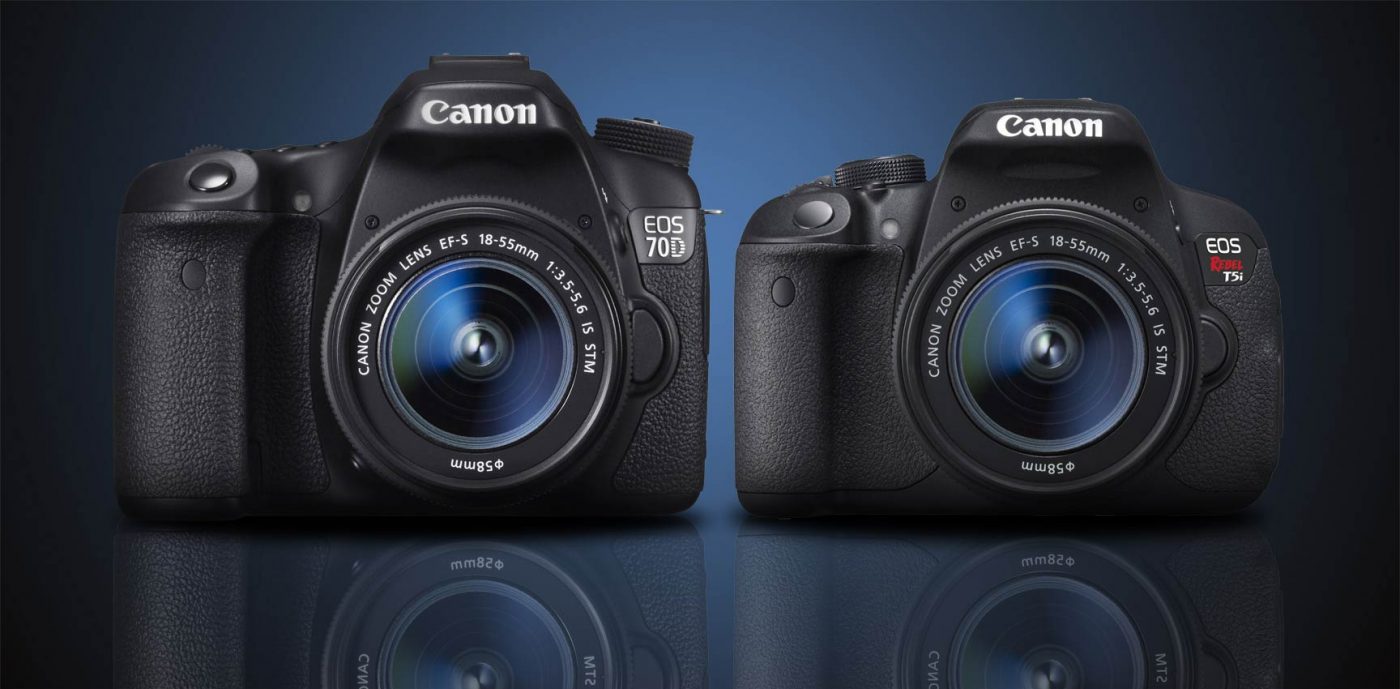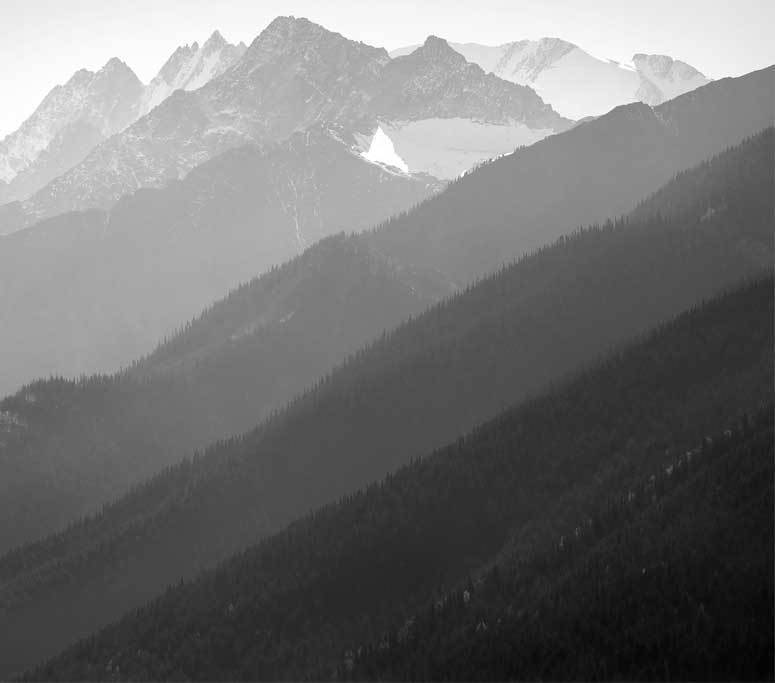CanonT5i vs 70D: How Do They Compare?
The Canon 70D and Canon Rebel T5i are both impressive, and relatively inexpensive new SLRs. At a cost of about $1199 for the body, the 70D costs nearly $400 more than the T5i, so it is no surprise that it has some advantages and extra features. But are those features worth the extra cost? The answer depends on what kind of photographer you are; for some, they will be a waste of money, for others, they’ll make a world of difference. Below, I’ll discuss the important differences and explain who will benefit from each.
The Basic Stats
Before we look at the details in depth, here’s a quick overview of the camera’s main stats.
| Canon 70D | Canon Rebel T5i | |
|---|---|---|
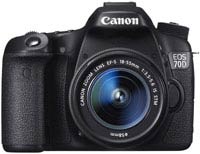 | 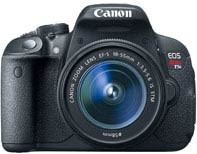 |
|
| BODY Price (Amazon.com) | $999 $1049 on Nov. 20, 2013 | $649 |
| 18-135mm STM KIT Price (Amazon.com) | $1299 | $849 |
| Body Material | Polycarbonate and Stainless Steel | Polycarbonate and Stainless Steel |
| LCD Size / Resolution | 3.0" 1,040,000 pixels | 3.0" 1,040,000 pixels |
| LCD Articulated? | Yes | Yes |
| LCD Touch Screen? | Yes | Yes |
| Sensor Size | 14.9 x 22.3mm (APS-C) | 14.9 x 22.3mm (APS-C) |
| Sensor Resolution | 20.2 Megapixels | 18 Megapixels |
| ISO Range | 100-12800 +25600 | 100-12800 +25600 |
| Total AF Focus Points | 19 | 9 |
| Cross-Type AF Sensors | 19 | 9 |
| AF Light Level Range | -.05 to +18 EV | -.05 to +18 EV |
| Metering System | 63 Zone Point Linked Evaluative 7.7% Center 3% Spot | 63 Zone Point Linked Evaluative 9% Center Weighted 4% Spot |
| Exposure Compensation | 1/2 or 1/3 stops via dedicated thumb dial | 1/2 or 1/3 stops via button + control dial |
| Max Frame Rate : RAW (14-bit) | 7 fps | 5 fps |
| Max Frame Rate : JPG | 7 fps | 5 fps |
| Max Burst Duration RAW (at highest frame rate) | 15 (16 w/ UHS-I card) | 6 |
| Max Burst Duration JPG (at highest frame rate) | 40 (65 w/UHS-I card) | 22 (30 w/UHS-I card) |
| Shutter Speed Range | 1/8000th - 30 sec. +bulb | 1/4000th - 30 sec. +bulb |
| Maximum Flash Sync Shutter Speed (standard flash) | 1/250th sec. | 1/200th sec. |
| HD Video Resolutions | 1080p, 720p | 1080p, 720p |
| Available HD Video Frame Rates | PAL and NTSC 24/25, 30 fps at 1080p 60/50 fps at 720p | PAL and NTSC 24/25, 30 fps at 1080p 60/50 fps at 720p |
| Available Codecs / Compression | H.264 IPB & All-I | H.264 |
| Battery Type | LP-E6 | LP-E8 |
| Battery Life | 1300 shots (viewfinder) 230 shots (live-view) | 550 shots (viewfinder) 200 shots (live-view) |
| Media Type | SD / SDHC / SDXC (UHS-I & Eye-Fi compatible) | SD / SDHC / SDXC (UHS-I & Eye-Fi compatible) |
| Weight | 755g (with battery) | 580g (with battery) |
| Viewfinder Coverage | 98% Frame, .95x magnification | 95% Frame, .85x magnification |
| Built-In Wireless Strobe Control | Yes | Yes |
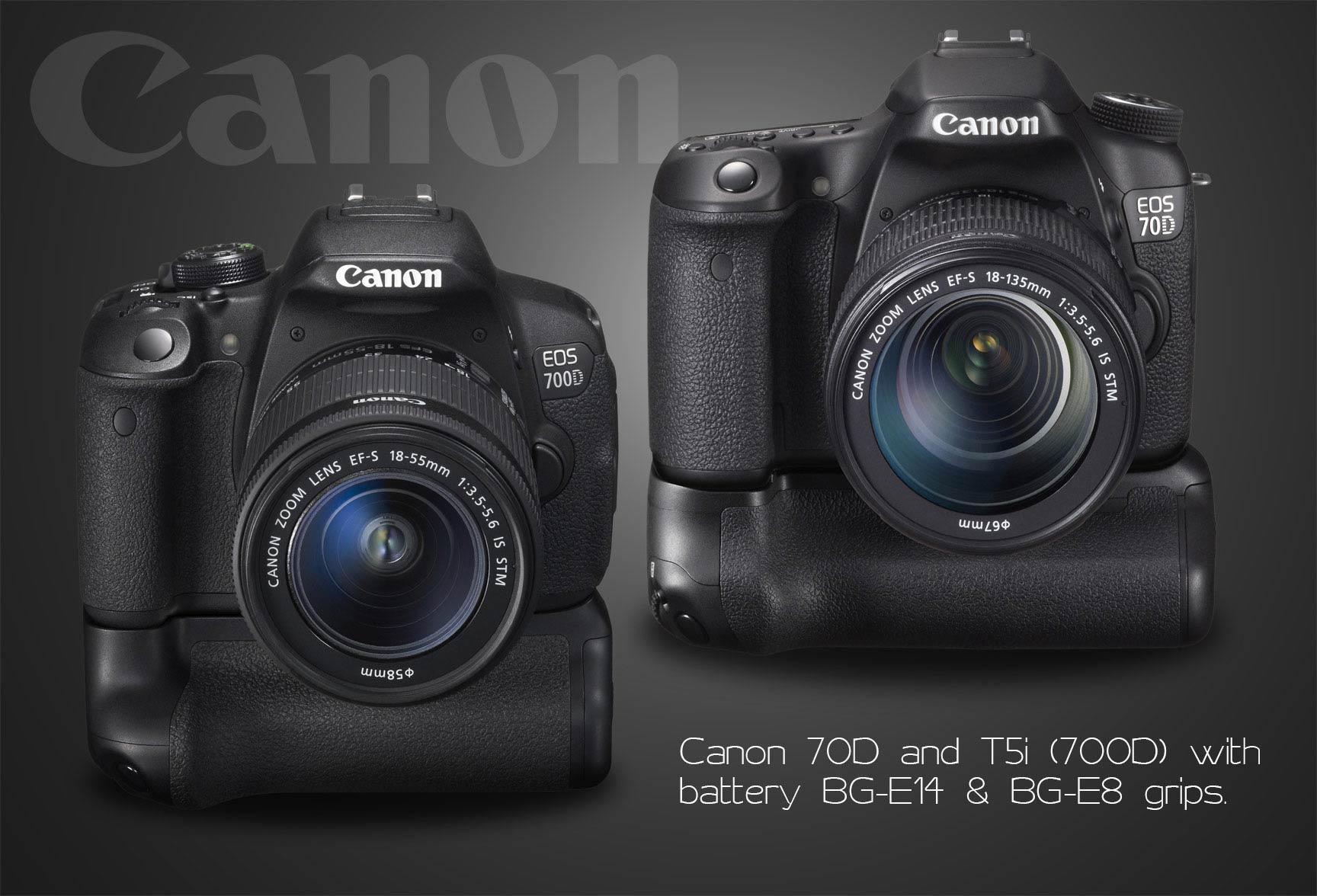
The New Sensor
Don’t expect a big difference in image quality. Yes, the 70D uses a newer, higher resolution sensor. The increase in resolution from 18 to 20 megapixels will not have much impact on your image quality, though. If you frequently make large prints, you might be able to squeeze and extra inch or two of width out of the 70D’s files when you’re pushing the upper size-limits, but this is rare for most photographers. Early tests show that the general sensor performance of the 70D is measurably better than that of the T5i, but not enough to really be noticeable without a side-by-side comparison… and frequently not even then, especially if you shoot JPG. So, if you’re thinking about buying the 70D, do it for the camera’s extra features (which will be worth it, for many buyers), not the improvement in image quality.
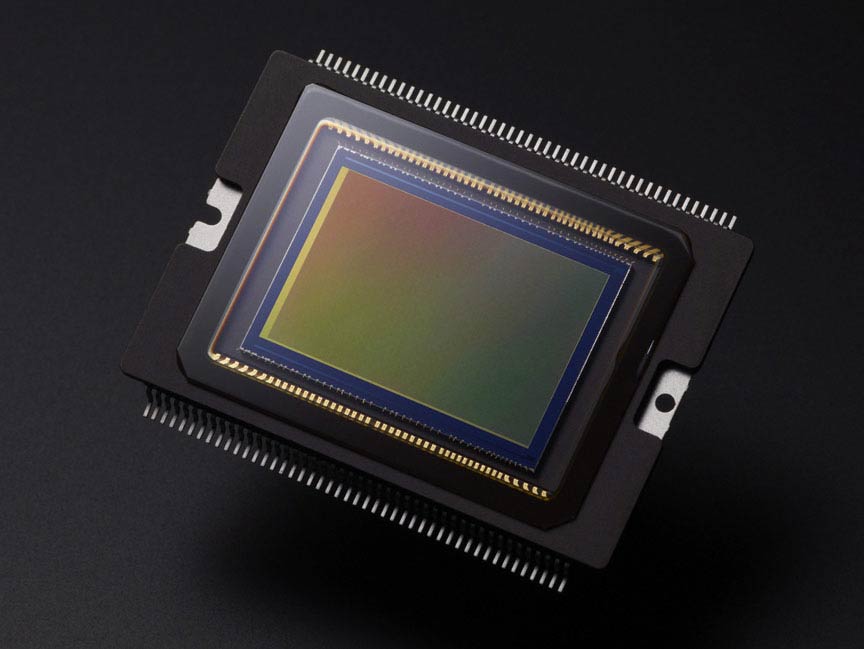
You see, the Canon 70D’s sensor IS a major technological development when it comes to autofocus functionality. The new sensor has phase-detection functionality1If you’re not sure what phase detection is or why it’s important, I recommend watching my video on the subject, here: http://www.youtube.com/watch?v=jbXJpVsTwo8 within the normal capture pixels, allowing it to focus quickly and accurately while shooting video, or while using live-mode (viewing the image on the rear LCD). Earlier SLRs such as the Canon 7D and 60D were capable of focusing while using live view, but the process was so painfully slow that most photographers did not use it regularly. The Canon 70D has changed everything: not only is Live-View now a useful tool, the camera can be used as a viable alternative to a video-camera, shooting full HD video with fast, easy to control autofocus.
The T5i, on the other hand, uses an intermediate technology called “Hybrid Autofocus”, which makes use of phase detection sensors built into the center area of the frame, which improves the focus speed over older cameras, but performance is still not as fast as the system in the 70D; in fact, it is significantly slower than many compact, mirrorless cameras made by Panasonic, Olympus, and Sony.
High Speed Performance
The Canon 70D outperforms the T5i in many speed-related categories. The 70D has a faster top shutter speed (1/8000th vs 1/4000th) and shoots more frames per second (7 fps vs. 5fps) than the T5i, and the 70D can sustain those shooting speeds much longer. While the T5i’s buffer will be full after shooting 6 RAW images, the 70D can shoot a full 16 of them in a row (or 65 JPG files). However, if you’re the type of photographer who doesn’t want to deal with RAW files, the T5i can shoot 30 JPGs in a row, which will be sufficient for nearly any amateur, and 5 frames per second is more than adequate for most amateur action photographers. That said, the 70D will feel like a more responsive camera, with a shutter lag of only 75 milliseconds compared to the 264 millisecond lag of the T5i.
Just as important, though, is the 70D’s autofocus system, inherited from the venerable Canon 7D. The 70D’s system contains 19 cross-type autofocus points (if you’re not sure what cross type points are, watch my explanatory video) giving it very solid performance when shooting sports and action. The T5i’s system is significantly improved over the T3i’s system, with all 9 of its autofocus points being cross-type (the T3i only had one cross-type). In fact, T5i’s AF system is now identical to that of the Canon 60D, but despite the improvement, it has significantly fewer focus point available to cover your subject when it is off-center, which can be a little more tricky to handle. Both systems will work very well when the subject is correctly placed behind a focusing point, but that’s an easier task on the 70D.
Body & Layout
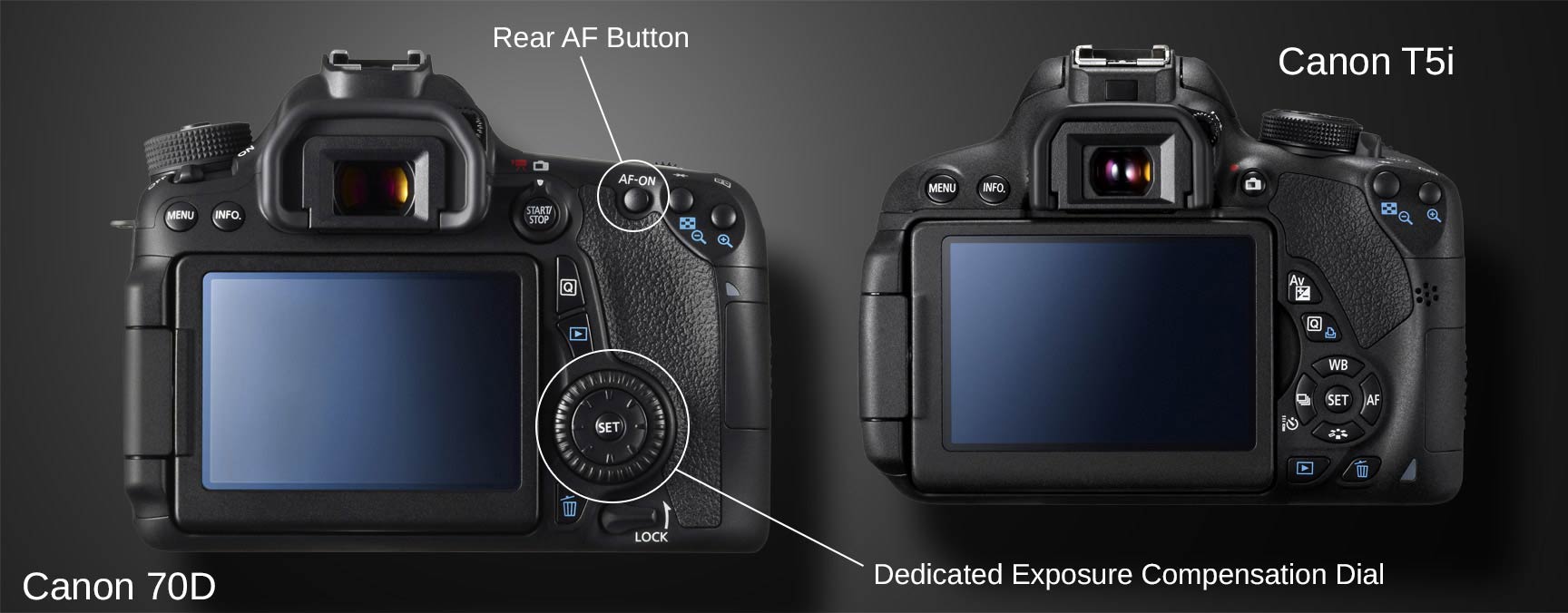
Personal preference plays a major role in determining which body size and style will be preferable for you. Some people prefer a heavier, larger body, and some people prefer something more lightweight and compact, and there is a significant difference between these two bodies. The T5i is clearly the lighter (about 25%) and smaller of the two. It’s also worth noting that, a result of the compact size and smaller power-source, you should expect to get less than half as many shots from a single battery. That said, if you prefer the T5i but have large hands, you can increase the size by adding a battery-grip such as Canon’s BG-E8 or a much less expensive 3rd party alternative like the Neewer Grip, both of which will double the cameras battery life as well.
It’s also worth mentioning that the Canon 70D features basic dust and weather sealing, while the T5i does not. If you often shoot photos in harsh conditions, this is worth considering.
Many professional sports and action photographers prefer to use a dedicated button on the back of the camera for autofocus rather than using the shutter-button. This makes pre-focusing at a specific place easier, and allows for easier tracking of a subject when there are obstructions, even when shooting pictures the whole time. If this is a technique you’d like to master, you’ll need to get the 70D; the T5i does not have a rear-AF button. [Correction: The T5i does support rear AF as a custom function, switching the AE lock to the shutter button. Thanks, Allen.]
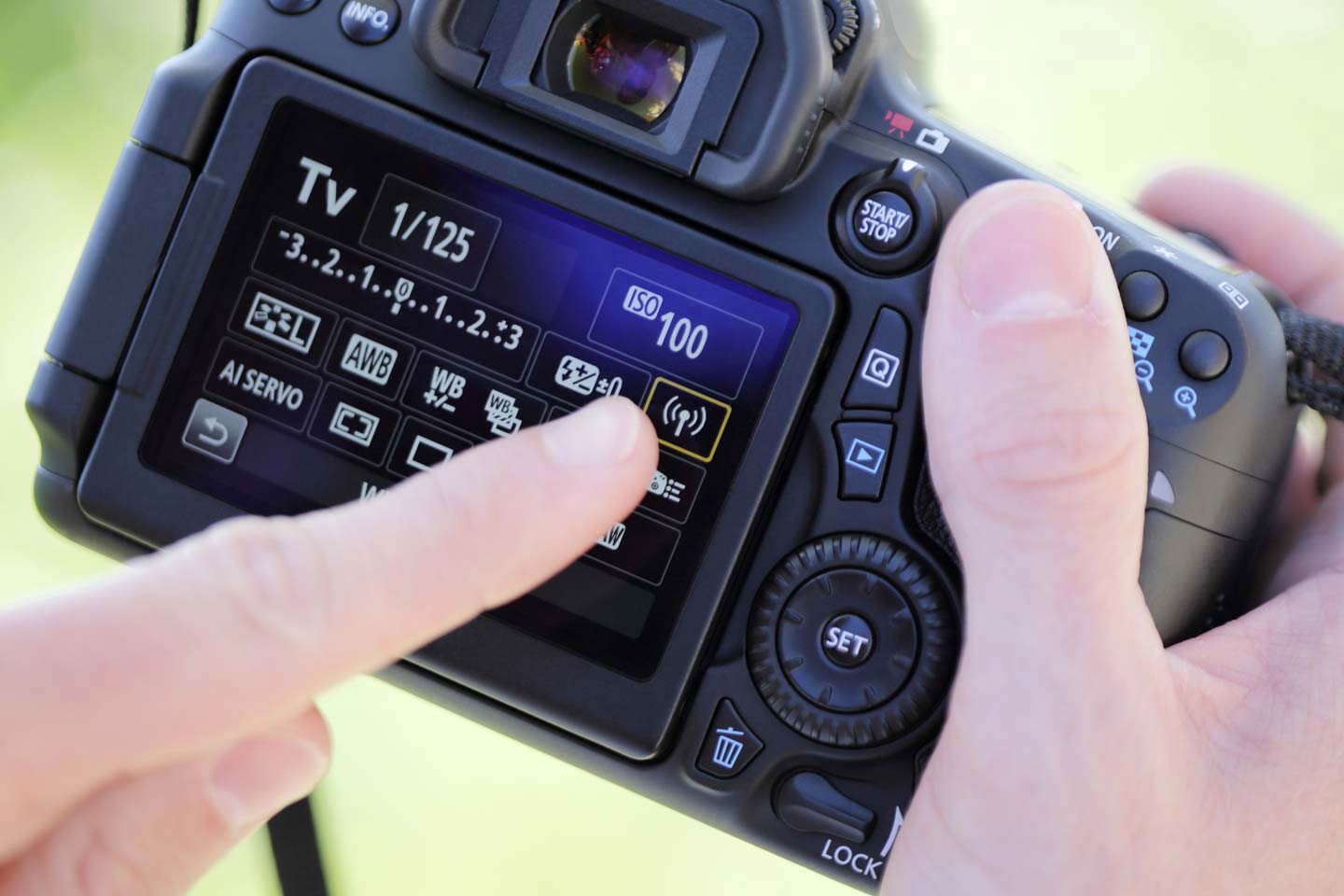
Easier to Use? Camera companies have odd ideas about what makes a camera easier to use. On entry-level models like the T5i, Canon has removed buttons and dials for features that many amateurs don’t use, making the layout simpler and potentially less confusing. However, the same features still exist in the camera, and if you want to use them, you have to navigate menus and sub-menus to turn them on, which makes using them much more difficult. Nowhere is this more obvious than when using exposure-compensation (ie, making the exposure brighter or darker than the camera automatically sets it). On the Canon 70D, there’s a big, friendly dial on the back of the camera, and if you want to make the exposure brighter, all you have to do is turn the wheel with your thumb to the + side, which you can easily do while looking through the viewfinder. On the T5i, you need to locate the exposure compensation button on the back of the camera, press it, and then make the adjustment with the main command dial. While not exactly rocket science, it’s not very intuitive, either.
To sum up: if you don’t plan on using advanced features, the T5i may be easier to use, but if you want a camera to grow into, the 70D will be easier to use when it comes time to work with more advanced features.
Conclusions: Which Should You Buy?
The Canon Rebel T5i is a feature-rich SLR that performs as well as mid-range SLRs from just a couple of years ago. If you’re interested in taking better pictures, it may be the safest place to start. However, there are some good reasons to consider the Canon 70D. This is how I’d make the choice:
Buy the Canon T5i if:
- You want a good, all-around camera that is easy to use right-away
- You shoot mostly portrait, family, travel and landscape pictures, along with some action
- Your primary interest is NOT video, or you plan on manual focus some of the time
- You prefer a compact, lightweight camera
Buy the Canon 70D if:
- You already have some experience with photography or want a camera to “grow into”; more advanced features are easier to use on the Canon 70D.
- You are serious about sports and action photography
- You are interested in using your SLR as a video camera; the Canon 70D is the only SLR on the market that is a viable alternative for the casual user (ie, without using manual focusing rigs, etc)
A Note About Lenses
The lens that you choose to work with is just as important (often more important) than the camera that you choose. However, lens choice is also part of the creative process and is specific to the subject and situation that you’re shooting; you’d use a very different lens for shooting a studio portrait than you’d use for shooting a sporting event at night or for shooting close-ups of insects.
If you’re looking for a good all-around, flexible lens, both cameras are available in a kit with Canon’s 18-135mm STM lens (the Canon 70D here, and the Canon T5i here), and I highly recommend it; the wide-angle end of the zoom is great for those times when you need to capture a larger area from up close or emphasize a foreground object, and the telephoto end is just powerful enough to shoot some sports, and it’s a great length for portraits. If you need a lens that performs well in low-light situations, Canon’s 50mm f/1.8 or 50mm f/1.4 USM let in much more light (10 or 16 times more than the 135mm f/5.6, respectively), and the f/1.8 version only costs about $100.
Questions?
In this post, I’ve attempted to highlight the most important differences between these two cameras, but there are many more than I can discuss in an article like this. If you still have questions, or would like further guidance, please let me know in the comments section below, and I’ll answer you as quickly as soon as I get a chance!

